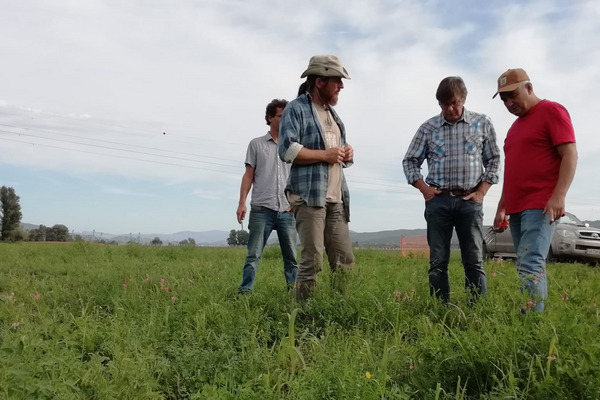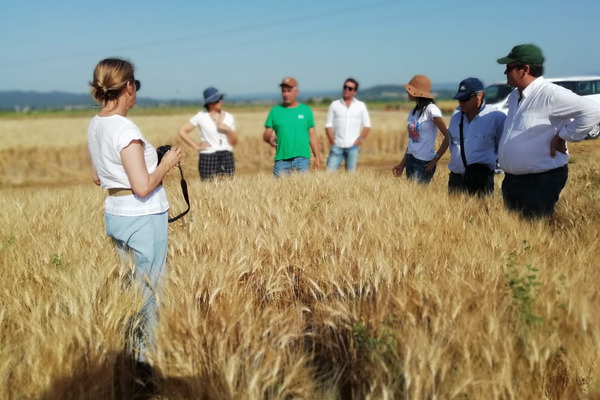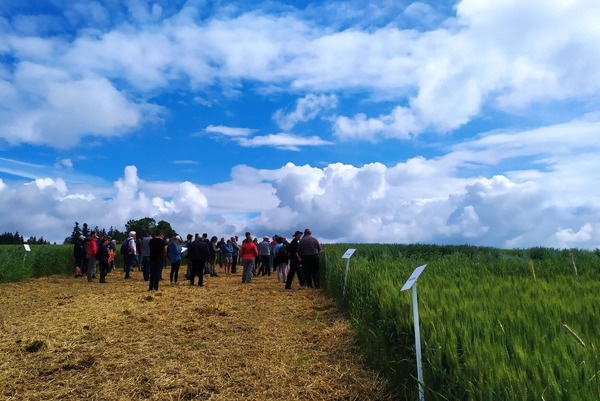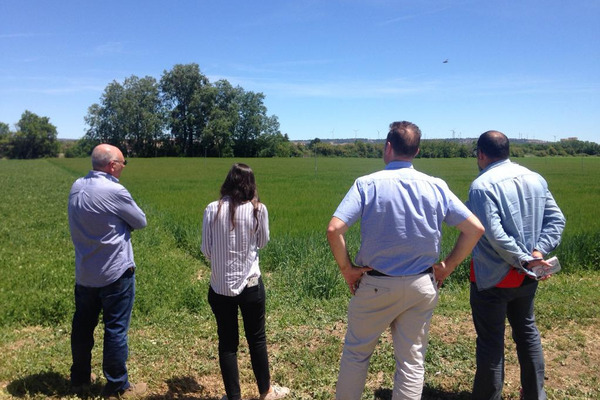Farmers participating in SolACE on-farm trials were based in France, Hungary, Italy, Spain, Sweden, Switzerland and the UK, growing bread wheat, durum wheat or potatoes. A main component of their feedback included reflections on the SolACE-identified sustainable farming innovations, which included new genotypes/genotype mixtures, microbial inoculants, grain legumes in rotation, reduced or no-tillage and decision support tools. Farmers were asked about barriers and enablers to utilising these sustainable farming practices as well as their experiences of participating in the trials.
Farmer-identified barriers and enablers
The main enablers and barriers to farmer uptake of sustainable farming practices were economic. Farmers were keen to increase profits and productivity by using innovations, with profits also tied to reduced costs. Particularly in the context of nutrient use efficiency, farmers aimed to reduce fertiliser inputs through sustainable practices without reducing yields. Simultaneously, concerns over the potential risks of adopting new practices were a barrier, especially if economic benefits do not outweigh the costs.
Although farmers spoke about financial benefits as being the main reason for adopting sustainable innovations, they also emphasised environmental reasons for changing practices, particularly in relation to soil health and improving climate change resilience. Improving soil quality was a key driver for farmers to adjust their management strategies, which also overlapped with a desire to respond to drought conditions that are increasing in frequency in the region.
Biotic stressors were emphasised by participant farmers, particularly in addressing pesticide-free alternatives for weed and disease control. This was also an area where farmers felt the SolACE innovations were lacking, as they would have liked to trial mechanical weed control and blight-resistant potato varieties, i.e., innovations that were out of the scope of SolACE.
Farmers spoke a great deal about information, resources and knowledge exchange as both enablers and barriers. The experience of participating in the SolACE project was noted as beneficial by farmers as an opportunity to share information with other farmers and gain technical support and resources from SolACE partners. At the same time, they noted that a lack of information and support can also be a barrier to either continue using some of the sustainable farming practices or to take them up from outside of a research project. In general, participant farmers highlighted that farmers have a large influence over their peers and that information and experience shared by farmers with other farmers is one of the main ways to encourage the adoption of sustainable farming practices.
Policies to encourage sustainable practices were not discussed often by SolACE participant farmers, but they did highlight that regulatory restrictions do impact their decisions to adopt more sustainable practices. In particular, farmers said that their interest in participating in the SolACE trials is partially driven by the limitations presented by pesticide regulation. As fewer chemical solutions are available through the EU’s approved pesticide list, farmers are seeking out non-chemical alternatives out of necessity.
Farmers experiences of the SolACE trials
Overall, farmers appreciated the experience of participating in the trials as an opportunity for collaboration with other farmers and as a way to access information and resources from researchers and agronomic advisors. The facilitation of knowledge exchange was clearly a benefit and, in some countries, participants were keen to continue to share ideas and experiment within the farmer network beyond the SolACE trials.
When participating in the SolACE trials, farmers were provided financial compensation, though this was not clear from the outset for each farmer network. Despite this initial confusion, farmers acknowledged that this remuneration was very important and encouraged their participation by mitigating economic risk. Direct payments to participate supported farmers in setting-up and managing on-farm trials. The additional support provided by SolACE partners for logistics and assessments was also important in facilitating farmer engagement.
The main criticism of the on-farm trials was that they were not long enough. Farmers wanted more data and trial years to validate results and to adjust methodological approaches to maximise the potential of different innovations. In some cases, farmers were frustrated that the on-farm trials were not planned to be longer from the start, suggesting that at least five years of trialling was a more appropriate baseline. Other participants noted that the learning curve inherent in setting-up on-farm trials meant that the focus of experiments was not clear until the final year of the trial. Finally, availability of innovations, variation in climate conditions and the restrictions of the Covid-19 pandemic affected the trials and more time would have helped to sort through all these complications.
Farmers also highlighted their interest in co-innovation in both developing sustainable farming practices and in designing experiments for on-farm trials. The hope in establishing participatory trials in SolACE was to include farmer perspectives from the beginning of the project, but this is very difficult to achieve in practice. Participants did not begrudge innovations being pre-determined by the project, but they did express a desire to focus on other areas (e.g., sustainable weed and disease management, i.e., pesticide-free alternatives) and to collaborate with researchers in designing bespoke trials for their own farm.
Further information
Further detailed results summarising farmer perceptions of the sustainable farming innovations in SolACE will be shared in Deliverable 5.1 of the project and in future publications planned. Additional materials related to the farmer networks and barriers and enablers to sustainable agriculture from the SolACE project include:
- Zenodo.org: Practice Abstract - How to ensure successful knowledge exchange between scientists and agricultural practitioners
- Zenodo.org: Policy Brief - Policy-level enablers and barriers to the uptake of Sustainable Farming Practices
- Zenodo.org: Policy Brief - Farm-level enablers and barriers to the uptake of Sustainable Farming Practices (will be published shortly)
- Youtube.com: SolACE Farmer Network Introduction
- Solace-eu.net: SolACE Farmer Networks








 tap and then scroll down to the Add to Home Screen command.
tap and then scroll down to the Add to Home Screen command.